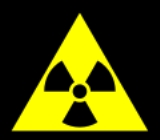
Ionizing radiation
Overview
Radiation
In physics, radiation is a process in which energetic particles or energetic waves travel through a medium or space. There are two distinct types of radiation; ionizing and non-ionizing...
composed of particles that individually have sufficient energy (or can liberate sufficient energy) to remove an electron from an atom
Atom
The atom is a basic unit of matter that consists of a dense central nucleus surrounded by a cloud of negatively charged electrons. The atomic nucleus contains a mix of positively charged protons and electrically neutral neutrons...
or molecule
Molecule
A molecule is an electrically neutral group of at least two atoms held together by covalent chemical bonds. Molecules are distinguished from ions by their electrical charge...
. This ionization produces free radicals, which are atoms or molecules containing unpaired electrons. These tend to be especially chemically reactive, and they account for most of the unusually high biological damage of ionizing radiation.
The degree and nature of such ionization depends on the energy of the individual particles (including photons), not on their number (intensity).

